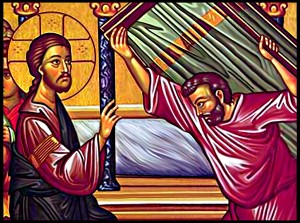1And when he returned to Capernaum after some days, it was reported that he was at home. 2And many were gathered together, so that there was no more room, not even at the door. And he was preaching the word to them. 3And they came, bringing to him a paralytic carried by four men. 4And when they could not get near him because of the crowd, they removed the roof above him, and when they had made an opening, they let down the bed on which the paralytic lay.
5And when Jesus saw their faith, he said to the paralytic, “Son, your sins are forgiven.”
6Now some of the scribes were sitting there, questioning in their hearts, 7“Why does this man speak like that? He is blaspheming! Who can forgive sins but God alone?” 8And immediately Jesus, perceiving in his spirit that they thus questioned within themselves, said to them, “Why do you question these things in your hearts? 9Which is easier, to say to the paralytic, ‘Your sins are forgiven,’ or to say, ‘Rise, take up your bed and walk’? 10But that you may know that the Son of Man has authority on earth to forgive sins”—he said to the paralytic— 11“I say to you, rise, pick up your bed, and go home.” 12And he rose and immediately picked up his bed and went out before them all, so that they were all amazed and glorified God, saying, “We never saw anything like this!”
Jesus forgives sins,
with divine authority,
for those with visible faith.
Jesus Forgives Sins
You’re probably not reading this post because you feel the weight of your sins. You have more pressing concerns. Your children are going astray. You have a big decision to make. You are suffering physically or emotionally. You need healing, like the paralytic. Regardless of your felt needs, Jesus wants to speak with you about your sins–and forgiveness.
Romans 3:23 says, “all have sinned and fall short of the glory of God.” All have done bad things and failed to do good things, including you. This is not easy to admit. You’re likely too busy to think about it much. Or maybe you’re aware of it, but you have constructed a good public image and would rather protect it than acknowledge your sin problem. You may have embraced a victim identity that makes it difficult for you to accept responsibility for your own sins. You may be the most mature Christian in your group of friends, which makes it hard to notice your own sinfulness in comparison. Maybe their sins are overt, and yours covert. Maybe you feel you’ve moved beyond the need for forgiveness in your Christian walk. Maybe you sin and don’t care about the consequences. Maybe you’re just now learning about the concept of sin.
Then again, many among us are aware of our sins. We experience the healthy conviction of the Holy Spirit, making us uncomfortable with our sin and causing us to humbly confess and change. We also experience the unhealthy accusation of the enemy, making us feel ashamed, guilty and afraid.
What ever your case may be, you need to acknowledge your sinfulness in order to see the glory of Jesus’ forgiveness.
Have you ever unloaded groceries from your car and attempted to carry more than you could handle? In order to be efficient, you grabbed every plastic handle that would fit in your fist. At first it seemed a manageable weight. But as you walk from the car to the house, the bags felt heavier and the plastic began to cut into your hands.
Sin is this way. It creates an accumulating weight. Right now, you may be able to bear the weight; but it won’t be so easy forever.
Now imagine you have a fight with your spouse one the morning. You say hurtful things and then leave for work. A faint guilt chases you through the day, but it’s relatively easy to overlook as you focus on your job. But what about when you get home and face her again? The full weight of your sin drops in your heart. You can no longer ignore the mass that stands between you. It’s this way with God too.
You can distract yourself from it now, and maybe for the rest of your life. But one day, you’ll meet him, and the full weight of your neglect, disobedience and rebellion will drop like a crate of anvils in your soul. Like Isaiah and Peter, when you see him face-to-face, you’ll be overcome with the weight of your sinfulness (Isaiah 6 and Luke 5).
Getting back to Mark 2, we don’t know why Jesus chose to forgive this man’s sins. We don’t know why Jesus did not heal him at first. But one thing is clear: Jesus forgave him. He forgives sins. And not like we can forgive. Not like a priest can forgive. Not like any human can forgive. Jesus forgives like only God can forgive.
Jesus Forgives Sins with Divine Authority
Jesus’ statement of forgiveness creates a theological problem. The scribes knew it. It is blasphemous to stand in the place of God and say that you’re forgiving sins–unless you are God. If Jesus is a blasphemer, we need to condemn him. If he is God, we need to fall on our knees before him, humbly seeking his forgiveness.
Forgiveness from God is different from other forgiveness. It is authoritative and effective. Suppose you’ve spent so recklessly that you are crushed by debt to your local bank. Your reckless spending has hurt your family deeply in many ways. They are financially damaged and emotionally wrung out from the stress. Imagine your spouse and children forgive you for all of this. What relief! But the situation remains and the bill is still due.
Now imagine that the owner and manager of the bank sends you a letter completely forgiving your debt. This is relief on a whole new level. This is authoritative and effective forgiveness which not only commits to stop holding the debt against you, but cancels the debt altogether. This is the divinely authoritative forgiveness Jesus gives, “by canceling the record of debt that stood against us with its legal demands. This he set aside, nailing it to the cross” (Colossians 2:14).
How can we receive this forgiveness? It requires faith. More specifically, it requires visible faith.
Jesus Forgives Sins with Divine Authority for Those With Visible Faith
Look back at Mark 2. Picture the four men carrying the paralytic through the tightly packed crowd, struggling up the steps leading to the roof. They set the man down carefully on the roof and begin ripping the thatch away, creating a large hole above Jesus. Then they quickly tie ropes to the four corners of the paralytic’s cot and begin lowering him down. When you picture this, what do you see? Determination? Desperation? Note what Jesus sees in verse five, “Jesus saw their faith.”
“Now faith is the assurance of things hoped for, the conviction of things not seen” (Hebrews 11:1). How can you see assurance and conviction? Through the actions they inevitably produce. Faith is an internal reality that always expresses itself through external actions.
14What good is it, my brothers, if someone says he has faith but does not have works? Can that faith save him? 15If a brother or sister is poorly clothed and lacking in daily food, 16and one of you says to them, “Go in peace, be warmed and filled,” without giving them the things needed for the body, what good is that? 17So also faith by itself, if it does not have works, is dead.
18But someone will say, “You have faith and I have works.” Show me your faith apart from your works, and I will show you my faith by my works. 19You believe that God is one; you do well. Even the demons believe—and shudder! 20Do you want to be shown, you foolish person, that faith apart from works is useless? 21Was not Abraham our father justified by works when he offered up his son Isaac on the altar? 22You see that faith was active along with his works, and faith was completed by his works; 23and the Scripture was fulfilled that says, “Abraham believed God, and it was counted to him as righteousness”—and he was called a friend of God. 24You see that a person is justified by works and not by faith alone. 25And in the same way was not also Rahab the prostitute justified by works when she received the messengers and sent them out by another way? 26For as the body apart from the spirit is dead, so also faith apart from works is dead. (James 2:14-26)
For Abraham, faith looked like offering his precious son in obedience to God’s command. For Rahab, faith looked like risking her life to identify with and help God’s people. For the paralytic and his friends, it looked like innovative determination to reach Jesus. From Hebrews 11 we see many more examples of visible expressions of faith. It can look like:
- sacrifice
- counter-cultural obedience to God
- moving forward in uncertainty
- waiting
- defying human authorities
- stepping down from prestigious positions
- conquering kingdoms
- enforcing justice
- obtaining promises
- escaping gravely dangerous persecution; such as lions, fire and sword
- finding strength in weakness
- becoming mighty in war
- putting armies to flight
- receiving back dead loved ones
- embracing torture
- suffering mockery, flogging, chains and imprisonment
- dying by stoning, saws and swords
- going about destitute, afflicted and mistreated
Ephesians 2:8 says, “For by grace you have been saved through faith. And this is not your own doing; it is the gift of God.” By grace, we are saved through visible faith, faith real enough to act on.
Conclusion
So what does faith look like in you life?
Do you identify with the crowd in Mark 2? Are you a disengaged observer, often in church, seldom acting on what you’re learning? Maybe for you, faith looks like acting on all the preaching you’re hearing. Think back to what you heard in Sunday school or the worship service last Sunday. What steps do you need to take in response?
Do you identify with the four friends? Are you concerned for someone that needs Jesus? Maybe for you faith looks like taking serious steps to pray for, grow closer with and communicate the gospel to him. How can you get him to consider Jesus? How can you show him Jesus’ love? How can you expose him to the brother love of the church? Can you invite him to lunch this week with some of your Christian friends? What is a concrete step you can take today?
Do you identify with the paralytic? Are you mainly needy right now? Maybe for you faith looks like leaning on some Christian friends to pray for you and give you counsel. Who can you email or call today to share your burden and ask for help? Maybe it looks like humbly confessing and repenting of your sins and accepting Jesus’ forgiveness.
Do you identify with the scribes? Are you hypocritically engaged with Jesus on a purely intellectual level? Maybe for you faith looks like shutting your mouth and humbly listening to his words, responding with real like obedience rather that mere talk.
Above all remember, Jesus forgives sins with divine authority for those with visible faith.







